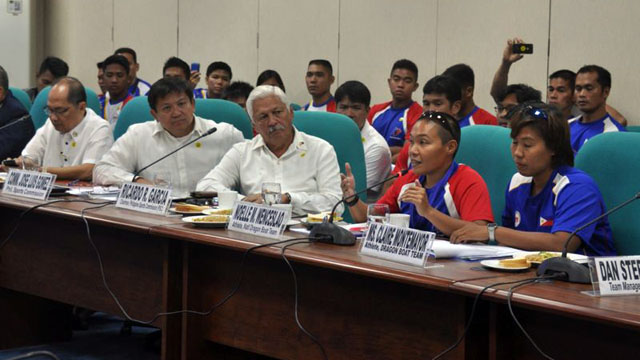SUMMARY
This is AI generated summarization, which may have errors. For context, always refer to the full article.

MANILA, Philippines — A chance to compete and bring pride to the country. That is all the members of the country’s national teams are after.
Yet for the upcoming Southeast Asian Games to be held in Myanmar this December, a good number of national athletes might not get that opportunity.
With the SEA Games barely two months away and the deadline for the submission of delegations passed, the Philippine Sports Commission (PSC), the Philippine Olympic Committee (POC) and the National Sports Associations (NSA) are continuously being scrutinized for the lineup they will be sending.
The number of delegates stands at 210, the smallest Philippine delegation yet. But even more flak went the way of the committees with several promising teams being excluded from the lineup. Among them is the National Dragon Boat team, which won gold at the 2011 SEA Games and has been a strong contender since 2003. There will also be no Philippine representative for volleyball, while the Azkals U23, despite offering to shoulder their own expenses, were also not given the go signal.
Dragon Boat team in limbo
During a Senate public hearing on Tuesday, October 22, the PSC, POC and the NSAs came under fire as Senator Pia Cayetano pressed the sports committees for explanations regarding the selection process.
As it turned out, the entire Dragon Boat team was terminated last July 15, 3 days after filing a complaint against several people from the NSA.
According to Noelle Wenceslao, the Dragon Boat team’s assistant team captain who was present in the hearing along with the rest of their team, they decided to request for an investigation against alleged questionable disbursement of funds and unethical conduct involving the treatment of athletes and drinking during international competitions.
“(Sa) isang meeting po namin we were given a courtesy resignation by the POC. Our team captain was terminated right then and there,” Wenceslao explained. “It was a meeting between the athletes and the NSA. Sa amin lang yun, doon sa bleachers. It was really not a formal meeting.”
Due to the team’s termination, it followed they would not be endorsed by the NSA despite the team already being included in the initial entry count submitted to Myanmar in June.
Eventually, the PSC revoked the team’s participation. According to Tomas Carrasco, any team without an endorsement from the NSA is not allowed to compete for the national team. Wenceslao also stated that the team is currently in limbo as they have not received any allowance for three months.
“Patuloy po kami nage-ensayo but since July, we have not received allowance for 3 months. We are still training for the SEA Games. If we’re given the chance, we are ready to compete at the SEA Games,” Wenceslao said. “It hurts that hindi kami makakapag-SEA Games because of technicalities.”
To complicate the situation further, one of the assistant coaches, Victoria Din, confirmed she personally saw alleged tryouts for a new team being conducted at the CCP area early on Tuesday.
“We feel that we are the complainants and yet kami bigla yung nasa floating status,” Wenceslao added.
Athletes should be protected, goals should be firm
Two years ago, the country pinned its hopes up high with the expectation of 70 gold medals. Instead, the 512 Filipino athletes failed to meet expectations as they hauled only 36 gold medals, the country’s lowest in 10 years. The Philippines finished 6th overall, which resulted to a lot of criticism as well.
This year, the PSC and POC are expecting the 210 athletes to take home a maximum of 46 gold medals and a minimum of 26. But for Cayetano, meeting the projected number of gold medals for the Philippines in relation to the number of delegates or simply getting the highest percentage of medals should not be the main goal. Instead, the goal must be to attain the first rank overall, if not a podium finish.
“Let us not reinvent our standards by saying (we achieved) 50% winning (medals). It’s good. I am with you in admiring na kalahati ng umalis may dalang medal. But it is not something that people will pat us on the back for,” Cayetano explained.
She also stressed the need for athletes to be protected and be given every means necessary for them to excel in their chosen sport.
“It is your job to ensure that these players have a place to play and have competitions to join.”
In addition, Cayetano also believes that even inexperienced teams should be given the chance to compete in order for them to grow and gain that much needed exposure. The argument can be said in the case of the Azkals U23 team that was also not allowed to compete for the reason that they have little experience.

Organizational problems
Apart from the Azkals U23 and the Dragon Boat team, the increasingly popular sport of volleyball is also suffering from what is perceived to be organizational and structural problems. As separate entities, the PSC and POC are having difficulty operating and moving things forward with issues that involve the NSA.
Senator Bam Aquino, who was also present at the hearing, expressed his thoughts on the perceived root of the problem.
“Parang nakikita ko kasi dito we have 3 organizations, we have the NSA, we have the POC, and the PSC. The accountabilities are either it’s not clear or it’s shared,” Aquino explained.
“Maybe it’s time for a review of the different institutions with regard to accountabilities because if you have a situation where a championship team, who has not been found guilty, is currently not able to compete in a sport where we have a big chance to actually win, clearly there’s something wrong in the systems. It’s time to revisit the different structures if it’s working or not.”
Sports as an inspiration
Cayetano underscored what she believes is the most important reason for the need to protect the welfare of athletes at all costs and to promote sports as much as possible.
“We have to remember that other than getting medals, you take kids out of the streets and take them out of potential abusive lifestyles when they get involved in sports,” she explained.
“Even assuming that a team doesn’t have enough time to really perform their best in the SEA Games. But if it inspires 2 million young Filipinos to become volleyball players instead of becoming a drug addict, and staying in school, wouldn’t that be worth the cost? Kung sasabayan mo yung kanilang appearance in the SEA Games ng grassroots programs, then you at least gave these children an alternative to a life that may not be available to them.”
She also said that she intends to follow up with the PSC and POC in the efforts to salvage the SEA Games lineup. More importantly, long-term improvement is also the priority for the future.
“Follow-up ko the possibilities of still including the other sports in the SEA Games,” Cayetano said. “And then after the SEA Games I will ask the Chair to reconvene another hearing to look into what kind of amendments or laws we will pass to protect the athletes and promote sports.”
For their part, the POC and PSC are working to improve the country’s sports grassroots programs to develop young competent athletes for future national teams. They do this through current programs that include Batang Pinoy and POC-PSC National Games.
Meanwhile, Carrasco assured that the POC will be looking at options for reconsideration regarding the Dragon Boat team’s participation in the SEA Games. Though chances are slim in lieu of the missed deadline and the still undecided status of the team.
In spite of the frustrations surrounding the upcoming SEA Games, Cayetano remains hopeful that there was significant progress made in the hearing that can help improve the situation of the country’s national teams.
“What I wanted to emphasize is that the law governing the Philippine Sports Commission and the law and mandate of the POC very clearly state that they should be promoting sports and, in the case of the PSC, not simply based on medal standing,” she explained.
“I’d like to think that in this hearing we were able to show them that we would prefer to support them if they were aggressive in promoting the rights of the athletes, in promoting sports in the Philippines. Rather than just sitting back and saying that’s not our mandate.” – Rappler.com
Add a comment
How does this make you feel?
There are no comments yet. Add your comment to start the conversation.